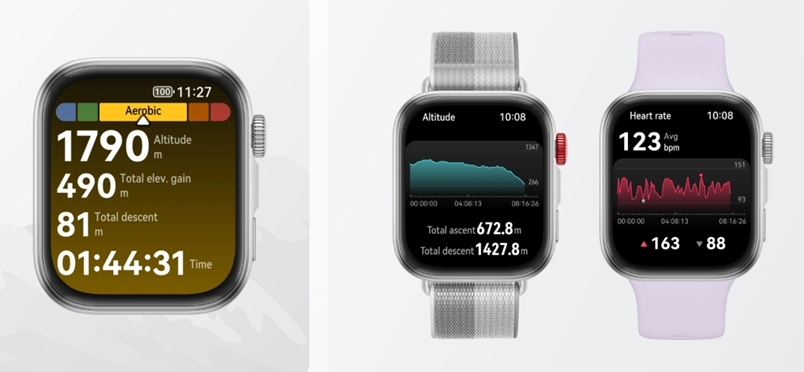Smartwatches are changing the way people monitor their health. These wearable devices are not just about telling time or tracking steps. They’re transforming personal health care by providing real-time insights into an individual’s well-being. Users can track vital signs, monitor chronic conditions, and detect potential health issues early. This tech empowers people to take better care of themselves by offering continuous health monitoring, aiding in disease management, and integrating with health care services. Let’s delve into how smartwatches are making a significant impact on personal health management.

Continuous Health Monitoring with Smartwatches
Real-Time Vital Sign Tracking
Smartwatches provide real-time tracking of vital signs, offering users immediate feedback on their health status. Sensors in these devices monitor metrics like heart rate and movement. This allows individuals to understand their daily physical activity levels more clearly. With such data, users can adjust their lifestyle choices, enhancing their overall health. Continuous tracking helps in identifying unusual patterns and encourages proactive health management.
Blood Oxygen and Heart Rate Monitoring for Health Insights
Advanced smartwatches measure blood oxygen levels and heart rate variability, crucial indicators of cardiovascular and respiratory health. These measurements help users gain insights into their fitness and stress levels. Low blood oxygen can signal health issues, urging users to seek medical advice. Continuous heart rate monitoring provides a clearer picture of cardiovascular health, helping in the early identification of potential problems.
Sleep and Stress Monitoring for Holistic Health
Smartwatches track sleep patterns and stress levels, crucial for holistic health. By analyzing sleep quality, users can make changes to improve rest and recovery. Stress tracking involves monitoring physiological responses and suggesting relaxation techniques. These features help people manage stress and sleep better, contributing to improved mental and physical health. Data-driven insights provide personalized advice for a more balanced lifestyle.
Smartwatches for Chronic Disease Management
Blood Pressure and Heart Disease Tracking
Smartwatches monitor blood pressure and detect irregular heart rhythms, aiding in heart disease management. Continuous tracking highlights trends and alerts users to abnormalities, prompting timely medical consultation. This proactive approach helps individuals manage heart conditions effectively. Regular monitoring supports the prevention of complications, encouraging adherence to prescribed treatments and lifestyle changes.
Assisting with Asthma and Respiratory Health
For those with asthma, smartwatches can track environmental conditions and respiratory metrics. These devices monitor air quality, alerting users to potential triggers. Respiratory rate tracking provides insights into lung health, supporting early intervention when needed. Users can manage their symptoms better by understanding patterns, which reduces the risk of severe asthma attacks. This assists in maintaining a higher quality of life.
Early Detection and Preventive Health
Identifying Early Symptoms of Health Conditions
Smartwatches aid in early detection by identifying symptoms before they escalate. By monitoring vital signs and patterns, they highlight possible health issues. Early alerts encourage users to consult healthcare providers sooner. This proactive approach supports preventive health care, reducing long-term health risks. Swift action leads to better outcomes and peace of mind for users.
AI-Driven Predictive Health Analytics
The integration of AI in smartwatches enhances predictive health analytics. Algorithms analyze health data to forecast potential conditions. This advanced technology identifies subtle changes over time, offering valuable health predictions. Users receive insights that inform lifestyle adaptations and medical consultations. Predictive analytics bolsters personalized health strategies, promoting long-term well-being.

Alerting Users to Potential Health Risks
Smartwatches can notify users of potential health risks in real-time. By analyzing patterns and deviations, these devices send alerts for conditions like atrial fibrillation or hypertension. Immediate notifications prompt users to take necessary action or seek medical advice. This feature plays a vital role in mitigating risks, providing a safety net for maintaining optimal health.
Integration with Healthcare Providers and Telemedicine
Connecting Wearables with Medical Professionals
Wearables link users directly with healthcare providers, facilitating seamless communication. By sharing health data collected from smartwatches, doctors can make informed decisions. This integration supports more precise diagnoses and tailored treatment plans. Patients benefit from continuous monitoring, fostering trust and collaboration with their medical team. This connectivity enhances patient care quality and outcomes.
Real-Time Data Sharing for Remote Monitoring
Smartwatches support remote monitoring through real-time data sharing. Health metrics like heart rate, activity, and sleep patterns are transmitted to healthcare professionals. This enables continuous observation and timely interventions without in-person visits. Remote monitoring ensures that patients receive consistent care, reducing hospital visits and improving chronic condition management.
Telemedicine and Wearables in Remote Health Management
Telemedicine combined with wearables revolutionizes remote health management. Smartwatches facilitate virtual consultations, allowing doctors to assess patients based on real-time health data. This approach enhances accessibility, especially for those in remote areas. By integrating wearables into telemedicine, patients receive comprehensive care without geographical barriers. This synergy improves patient engagement and health outcomes.
Conclusion
Smartwatches are indeed transforming personal health care. They offer continuous health monitoring, support chronic disease management, and integrate seamlessly with healthcare services. By facilitating early detection and preventive care through real-time data sharing, these devices empower users to take control of their health proactively. For example, the Huawei Fit 4 offers comprehensive health tracking features that enhance wellness. As technology advances, the role of smartwatches in health care will only grow, promising even more innovative solutions for personal health management. Users can look forward to a future where wearable tech significantly enhances their well-being.
